- Home
- Janelle Taylor
Can't Stop Loving You Page 19
Can't Stop Loving You Read online
Page 19
“If the weather was nicer today, you’d be able to see the Manhattan skyline straight out your window,” he told Mariel.
“We’re that close?”
He nodded. “Less than an hour away, with any luck.”
She smiled. “I can’t wait to be in the city again.”
“When was the last time?” he asked, surprised.
“When I was in high school,” she admitted. “I went on a trip with my choir, and I never forgot it. That was when I decided that I wanted to live there, and have a career in musical theater.”
She had told him about that trip, years ago, when they were together. He had been enchanted by the image of a small-town Midwestern girl coming to the big city with stars in her eyes.
“You never came back again?”
“No,” she said. “I always wanted to, but…”
“Well, in that case,” he said, banishing unsettling thoughts of the past, “we’d better hurry up and get there.”
He pulled into the passing lane, picking up speed.
“Why?” she asked, laughing.
“Because you’ve got a lot to see, and we don’t have much time.”
“You don’t have to take me sightseeing, Noah,” she protested.
“I know. But I want to,” he said truthfully. “It’ll be a pleasure to see the city through your eyes, Mariel. Maybe you can help me fall in love with it again, because lately, I can’t seem to remember why I live there. Do you ever feel that way about Rockton?”
“Not anymore,” she said after thinking about it for a moment.
And for an instant, he imagined himself there, in her small Midwestern town.
That’s a crazy, totally insane thought, he told himself. Yet maybe it wasn’t. Hadn’t he been toying with the idea of pulling up his roots and starting over again, someplace affordable, someplace where the living was easier than it was in Manhattan?
Oh, come on. There are hundreds of thousands of places like that—sleepy American towns where getting through each day, once you venture past your own door, isn’t a challenge.
Yes, but only one place had Mariel in it.
Well, he couldn’t just move to Rockton, Missouri, because she lived there.
The bridge traffic had come to a standstill in front of the toll booths, and Noah kept his foot on the brake, creeping forward every time the traffic in front of him moved.
“What’s it like?” he asked Mariel.
She looked at him blankly.
“Rockton,” he said, realizing she had lost track of the conversation.
“Oh, Rockton.” She shrugged. “It’s small. The people are kind and caring, and pretty conservative, which used to bother me. But now I don’t mind as much, maybe because I’m a teacher. I guess traditional values are a good thing, especially when children are involved. Let’s see, what else can I tell you? Everybody knows everybody else. There’s a barbershop with an old-fashioned striped pole out front. There are two supermarkets, and both of them carry only iceberg lettuce.”
“No mesclun?” he asked with a grin.
“Not even romaine,” she said with a sigh. “And like I said, there aren’t many places to shop for clothes—or anything else. Although we do have a big feed store and a couple of places to buy farm equipment. Oh, and there’s a new restaurant that’s supposed to be pretty good, out on the highway. I think it’s called…hmm, what was it? Oh, yeah. Pizza Hut.”
He burst out laughing.
She joined in. “The sad thing is, I’m serious, Noah.”
“That’s not sad,” he said. “I think it sounds charming.”
“It is.” She fell silent.
He eased the car forward.
He wanted her to invite him to visit her in Rockton sometime.
But she didn’t.
She merely leaned over to the tape deck and pressed the Play button. The cassette whirred, and then Bob Dylan’s voice filled the car once again.
“What the hell…?”
“What’s the matter?” Mariel asked Noah, who stood in the vestibule of his building, staring into the metal mailbox he had just unlocked.
“My roommate hasn’t picked up the mail,” he grumbled, pulling envelopes and flyers from the crammed box. “It looks like this is yesterday’s mail, and today’s. I left him a message asking him to get it for me. That’s the least he could do.”
Mariel shrugged, thinking that Leslie probably hadn’t gotten their mail, either, and Daddy probably wouldn’t think to, now that he no longer lived with them. It wasn’t that big a deal. She would be home tomorrow.
The thought wasn’t comforting, though.
Now that she was in New York, she wasn’t in any hurry to leave. She wondered if she could ever get her fill of the sprawling city, with its fleet of bright yellow cabs and teeming sidewalks and dazzling store windows. She had stared out the window, fascinated, as Noah drove the car around block after block, cursing as he looked for a parking space. When they finally found one and he complained because it was a long distance back to his building, she had assured him that she didn’t mind. It was a thrill to stroll along the sidewalk with him, taking in the sights. He had insisted on carrying both her bag and his, so all she had to worry about was keeping up with his long-legged pace and making sure she stopped on the curb whenever a sign said DON’T WALK.
“Okay, let’s go,” Noah said, hoisting his duffle bag over his shoulder once again and picking up her suitcase in one hand as he clutched the mail in the other. “It’s a walk-up, so get ready to exercise.”
He wasn’t kidding. When they finally reached the top floor, she was out of breath, and she wasn’t even the one hauling the luggage. He led the way to his door and handed her the stack of mail to hold while he fished for his keychain in his pocket.
“I can’t believe I’m about to see the inside of a real New York City apartment,” she said as Noah inserted his key into the top lock on the battered gray door.
“Don’t expect too much,” he said, turning the key. The lock clicked, but instead of pushing the door open, he put a different key into a different lock below the first one.
“Is this a safe neighborhood?” she asked, noticing that there was a third lock, and that there was a peephole on the door, too.
“Yeah, it’s pretty safe,” Noah said, jangling his keys, searching for the next one. “I should warn you—my roommate will probably be here. He usually is at this time of day.”
“That’s okay.”
“You say that now,” he said with a snort.
Mariel looked around the hallway, wondering what it would be like to live in a place like this. She supposed it could be difficult, climbing all those steps every time you wanted to come or go.
She glanced at the dingy, mustard-colored paint on the walls and the row of closed, numbered doors along the corridor. She thought about her house back home, perched in the middle of a tree-shaded block lined with clapboard houses with shutters and yards, some with picket fences. She thought about how the neighbors always waved as she came and went, and how the whole street got together for a block party every September, and how at this time of year the air was scented with freshly mown grass and roses.
She wondered if she ever could be happy living as Noah did. He certainly didn’t seem to be content here in New York. She realized that he would probably be willing to leave, if he had a good reason. A reason like—
“There we go, come on in,” he said, throwing the door open at last, calling, “Alan?”
There was no reply.
She stepped over the threshold, glad to be distracted from the thought that had been on the verge of materializing.
She found herself in a tiny hallway. It could have been nice, she supposed, if it weren’t so—dark. There were no windows. And there was no furniture, only an exercise bike that had several coats and jackets draped over it.
“Alan?” Noah called again, poised, listening.
The apartment was silent.
Mariel couldn’t think of anything to say as she looked around.
Noah laughed at her. “You’re speechless, huh? This is what we call a foyer here in New York City,” he said. “Anywhere else, it would be a closet.”
She laughed, too, and followed him through the nearest doorway. There were three—one obviously leading to a kitchen and the second to the bathroom. The third, which they crossed, led to a living room. Here there were windows, and she wondered if the room might have been brighter if it were a sunny day. But when she crossed the room and looked out, she saw that any sunlight would be blocked by the tall buildings across the street.
She looked at the piles of books and papers, the stacks of CDs, the few forlorn-looking pieces of furniture. She saw the bare nails on the walls and the exposed cords stretched along the floors, and the dust and the crumbs. The place desperately craved a good cleaning. And a woman’s touch.
There was no evidence of Noah’s ex-wife here. She had feared that there might be, but now she found it almost disconcerting that there wasn’t. This was clearly a bachelor pad; nothing about it was soft or warm or welcoming. It spoke of loneliness—of a solitary life.
“It’s a dump,” Noah said flatly.
“No, it isn’t,” Mariel protested.
“Yes, it is,” he said, crossing the room and dropping to the couch. “It’s as though I’m seeing it for the first time. You get kind of used to it when you’re living in it, but now—after the Sweet Briar—I mean, look at this place. What made me think this apartment was so wonderful that I couldn’t move out of it after Kelly left?”
Mariel went to sit beside him, following his incredulous gaze around the room. “Noah, you can’t compare it to the Sweet Briar. That’s an inn.”
“It’s a house, too. A house—not an apartment. Maybe I’m ready to live in a house.” He looked at her.
His face was close. She fought the urge to reach up and brush a stray lock of dark hair from his eyes. “Maybe you should live in a house.”
“It won’t be here. There are no houses here in Manhattan, unless you’re a multimillionaire.”
“You can always move.”
“To where?” The two words were loaded with suggestion, begging a reply. And not just any reply.
She shrugged and dragged her eyes away from his gaze. He put a finger under her chin and turned her face back to him, forcing her to look up at him.
“Mariel,” he said softly, “where can I go? I’m looking for a small town. The kind of place where I can breathe easily. Maybe the kind of place that has an old-fashioned barbershop with a pole…and a Pizza Hut.”
Her breath caught in her throat. “Noah—”
“Shh, wait, just let me say this. I want us to start over. I want us to be together, Mariel. I’m not asking you to drop everything, pick up your whole life, and change it to suit me. All I want—”
“Is for you to do exactly that to suit me,” she cut in, her mind spinning. “You’re telling me that you want to move to Rockton to be with me, Noah? That makes no sense.”
“It makes perfect sense.”
She shook her head, desperately wishing it were true. But it wasn’t. This didn’t make sense.
It was just like before, she thought, trying to fight back the wave of panic that rose within her. Just like that long-ago day in the dorm room, when he had gotten down on his knee and proposed marriage.
Once again, Noah was caught up in the moment without seeing the big picture. Once again, he was rushing to an idealistic conclusion, assuming that just because he wanted something, he could make it happen.
She bristled at the thought of him swooping into her world, the isolated, safe little world that had harbored her after the tempestuous year she had spent with him. If Noah came to Rockton, there would be no escape. There would be nowhere to retreat to protect her heart from being shattered again.
This wasn’t fair.
It wasn’t what she wanted.
She felt trapped.
“We can just try it, Mariel,” he said fervently. “We can see if we can make it work.”
“It’ll never work, Noah,” she said, her gaze focused on his, though she realized he wasn’t even seeing her.
He was seeing what he wanted to see.
“You don’t know that,” he shot back, his voice halfpleading, half-contradictory. It was the plea that made her uncomfortable.
He wanted so badly for this to work.
She recognized that, because some part of her wanted the same thing.
But she couldn’t take another chance on him. She had lost too much the first time. More than she was willing to lose again.
Then she had been a teenager. Teenagers were supposed to have a few false starts as they tried to find their way through life. Adults were supposed to be settled. They were supposed to know where they were headed. Hell, they were supposed to be there, at their destination. And she had thought she was.
The first time her life had been shattered, she had scrambled to pick herself up, losing herself in school, and her family and friends.
She was no longer in school. Her mother was dead; her father, aged and living in Florida most of the time; her sister, about to marry Jed and leave home. Katie Beth was married and had a family of her own.
Everything that had sustained her the first time she had been nearly destroyed was no longer there for her. If they tried once more to make a go of it together, and they failed, she wouldn’t survive.
But what if you don’t fail? a faint, hopeful voice asked. What if this is your one chance at true happiness, and you’re about to blow it?
No. She couldn’t take the risk.
“I’m sorry, Noah,” she said, shaking her head, her voice hoarse with emotion. “If we were meant to be together, we would have found a way to make it work the first time. Instead, we both walked away.”
“That was different. We were kids. We’d been through hell.”
She shook her head, not wanting to let him talk her out of it. She had to stand her ground.
“No,” she said.
He looked at her in disbelief. “You’re telling me that I can’t move to Rockton, Missouri, if I feel like it?”
“That’s exactly what I’m telling you,” she said.
“You’re telling me that you’d rather keep on living like you are, all alone, hiding out in this small town?”
“Hiding out?” she echoed angrily. “Who says I’m hiding out?”
He rose and strode across the room, then spun around to look at her. “What else are you doing if you’re not hiding? You had big plans, Mariel. You took the easy way out.”
“That’s not true!”
“Then, why did you give up your dreams? You were going to be an actress, see the world, live in New York.”
“You have no right to judge my life by what I said I wanted when I was eighteen,” she retorted, leaping off the couch to confront him. “I love my life, Noah, no matter what you think of it. It makes me happy, just the way it is.”
“Then, why are you alone?”
“Why are you?”she shot back.
They stared at each other. Her hands were trembling. Her whole body was trembling. She wanted to sob, to take it all back, to hurl herself into his arms and beg him to just hold her. She wanted to do anything but stand here looking at him, but she was frozen, consumed by a potent mixture of passionate rage and passionate need.
He spoke first. “I haven’t been alone for the past fifteen years, Mariel. I was married. I took a chance. It didn’t work out, but at least I’m not afraid to be with somebody else.”
His words stung. “I’m not afraid to be with somebody else,” she said, struggling to keep her voice level.
“No, you’re afraid to be with me.”
She chose to ignore that, saying instead, “You’re the one who isn’t happy with his life, Noah, not me. You’re the one with a job you hate, living in a place you hate. You’re the one who feels compelled to make changes. Not
me.”
“I didn’t take the easy way out,” he said again.
Her temper flared. “Didn’t you? Wouldn’t you rather be writing screenplays? Wouldn’t you rather be living someplace else? Stop blaming your ex-wife for the things that are wrong in your life.”
“I don’t blame her.”
“I think you do.”
“Well, you’re wrong,” he said, but she could see in his eyes that she wasn’t. Not entirely. He did blame his ex.
And he blamed her, she realized. Just as she blamed him.
“Maybe you’re right,” he said suddenly, and she blinked at the contradiction. “Not about me blaming Kelly, because that’s not what this is about. What you’re right about is that this wouldn’t work between us.”
“No, it wouldn’t work,” she said, deflating.
“I can’t believe that for a minute there, I had convinced myself that things could be different.”
She shrugged. So she had won the argument.
And she felt lousy.
“Look, I don’t want this to change anything as far as Amber goes,” he said. “We still have an obligation to find her.”
“Maybe we should leave that to the Steadmans and the police and Henry Brando,” she said. “Maybe we should call somebody and tell them what Sherry told us, and maybe we should just take ourselves out of this. Maybe we’re only complicating matters for everyone involved.”
He gaped at her. “Do you really think that?”
“Amber is a mixed-up girl, Noah. Mixed-up enough to have run away from home. Do you think that if we get involved it’s going to help matters any?”
“She went looking for you because she needed you,” Noah pointed out.
His words caused a pang in Mariel’s heart, but she forced herself not to think about that. She had no business having maternal feelings for a child she had given to somebody else to raise. She had done that because she wanted what was best for Amber. Maybe staying out of her life now would also be what was best.
“And maybe I came here looking for her because I needed her,” Mariel said around a lump in her throat. “But like you’ve said, I’m selfish.”

 Shadowing Ivy
Shadowing Ivy Chase The Wind
Chase The Wind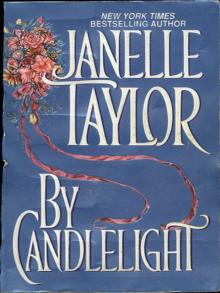 By Candlelight
By Candlelight Kiss of The Christmas Wind
Kiss of The Christmas Wind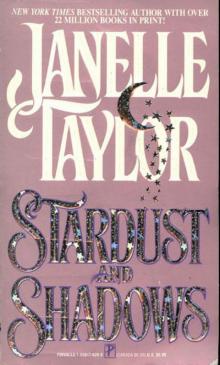 Stardust And Shadows
Stardust And Shadows Forever Ecstasy
Forever Ecstasy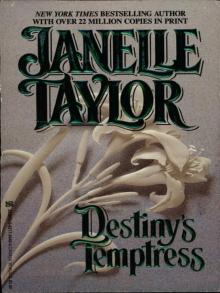 Destiny's Temprtress
Destiny's Temprtress Haunting Olivia
Haunting Olivia Wild Is My Love
Wild Is My Love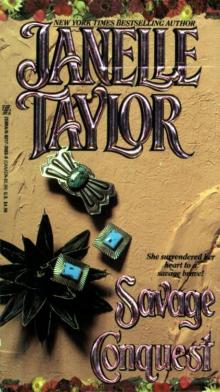 Savage Conquest
Savage Conquest Valley of Fire
Valley of Fire A Christmas Surprise
A Christmas Surprise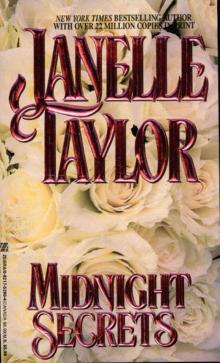 Midnight Secrets
Midnight Secrets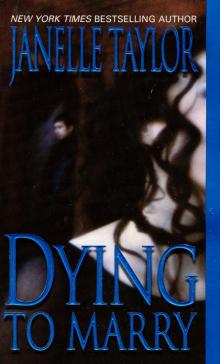 Dying To Marry
Dying To Marry Brazen Ecstasy
Brazen Ecstasy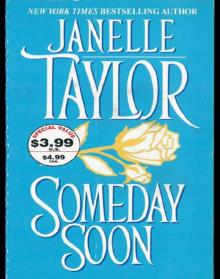 Someday Soon
Someday Soon Savage Ecstasy
Savage Ecstasy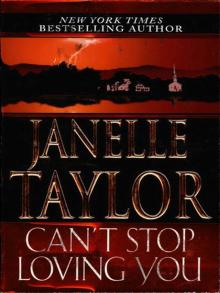 Can't Stop Loving You
Can't Stop Loving You Golden Torment
Golden Torment Forbidden Ecstasy
Forbidden Ecstasy Fortune's Flames
Fortune's Flames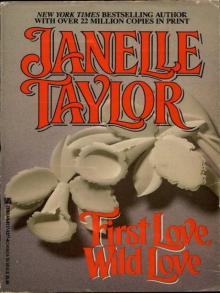 First Love Wild Love
First Love Wild Love Follow The Wind
Follow The Wind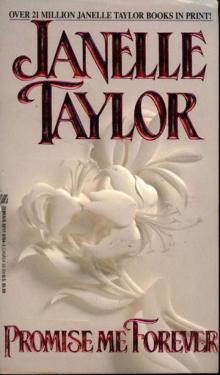 Promise Me Forever
Promise Me Forever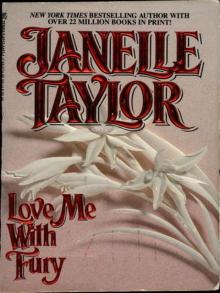 Love Me With Fury
Love Me With Fury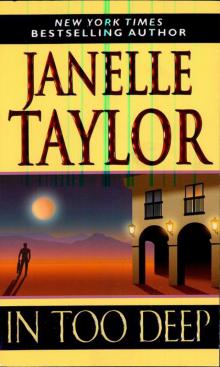 In Too Deep
In Too Deep Lakota Winds (Zebra Historical Romance)
Lakota Winds (Zebra Historical Romance)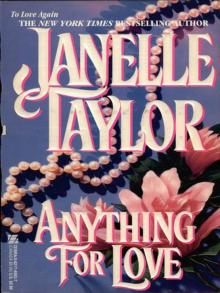 Anything For Love
Anything For Love Cherokee Storm
Cherokee Storm Straight From The Heart
Straight From The Heart Don't Go Home
Don't Go Home Wild Winds
Wild Winds Tender Ecstasy
Tender Ecstasy Defiant Ecstasy
Defiant Ecstasy Defiant Hearts
Defiant Hearts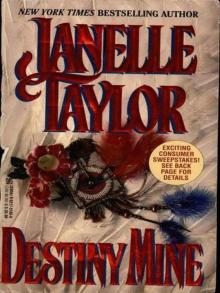 Destiny Mine
Destiny Mine Lakota Flower
Lakota Flower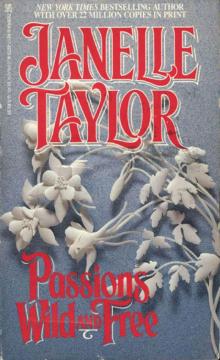 Passions Wild And Free
Passions Wild And Free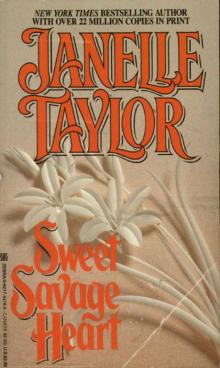 Sweet Savage Heart
Sweet Savage Heart Stolen Ecstasy
Stolen Ecstasy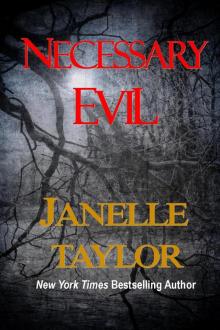 Necessary Evil
Necessary Evil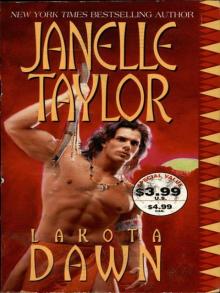 Lakota Dawn
Lakota Dawn